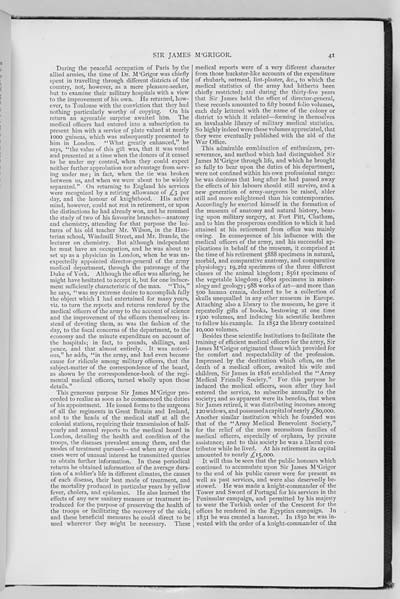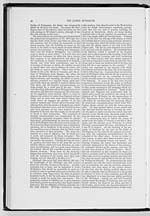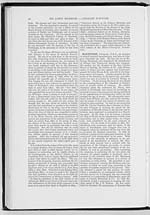41
During the peaceful occupation of Paris by the
allied armies, the time of Dr. M 'Grigor was chiefly
spent in travelling through different districts of the
country, not, however, as a mere pleasure-seeker,
but to examine their military hospitals with a view
to the improvement of his own. He returned, how-
ever, to Toulouse with the conviction that they had
nothing particularly worthy of copying. On his
return an agreeable surprise awaited him. The
medical officers had entered into a subscription to
present him with a service of plate valued at nearly
1000 guineas, which was subsequently presented to
him in London. "What greatly enhanced," he
says, "the value of this gift was, that it was voted
and presented at a time when the donors of it ceased
to be under my control, when they could expect
neither further approbation nor advantage from serv-
ing under me; in fact, when the tie was broken
between us, and when we were about to be widely
separated." On returning to England his services
were recognized by a retiring allowance of �3 per
day, and the honour of knighthood. His active
mind, however, could not rest in retirement, or upon
the distinctions he had already won, and he resumed
the study of two of his favourite branches�anatomy
and chemistry, attending for that purpose the lec-
tures of his old teacher Mr. Wilson, in the Hun-
terian school, Windmill Street, and Mr. Brande, the
lecturer on chemistry. But although independent
he must have an occupation, and he was about to
set up as a physician in London, when he was un-
expectedly appointed director-general of the army
medical department, through the patronage of the
Duke of York. Although the office was alluring, he
might have hesitated to accept it, but for one induce-
ment sufficiently characteristic of the man. '' This,"
he says, "was my extreme desire to accomplish fully
the object which I had entertained for many years,
viz. to turn the reports and returns rendered by the
medical officers of the army to the account of science
and the improvement of the officers themselves; in-
stead of devoting them, as was the fashion of the
day, to the fiscal concerns of the department, to the
economy and the minute expenditure on account of
the hospitals; in fact, to pounds, shillings, and
pence, and that almost entirely. It was notori-
ous," he adds, "in the army, and had even become
cause for ridicule among military officers, that the
subject-matter of the correspondence of the board,
as shown by the correspondence-book of the regi-
mental medical officers, turned wholly upon those
details."
This generous purpose Sir James M'Grigor pro-
ceeded to realize as soon as he commenced the duties
of his appointment. He issued forms to the surgeons
of all the regiments in Great Britain and Ireland,
and to the heads of the medical staff at all the
colonial stations, requiring their transmission of half-
yearly and annual reports to the medical board in
London, detailing the health and condition of the
troops, the diseases prevalent among them, and the
modes of treatment pursued�and when any of these
cases were of unusual interest he transmitted queries
to obtain further information. In these periodical
returns he obtained information of the average dura-
tion of a soldier's life in different climates, the causes
of each disease, their best mode of treatment, and
the mortality produced in particular years by yellow
fever, cholera, and epidemics. He also learned the
effects of any new sanitary measure or treatment in-
troduced for the purpose of preserving the health of
the troops or facilitating the recovery of the sick;
and these beneficial measures he could direct to be
used wherever they might be necessary. These
medical reports were of a very different character
from those huckster-like accounts of the expenditure
of rhubarb, oatmeal, lint-plaster, &c., to which the
medical statistics of the army had hitherto been
chiefly restricted; and during the thirty-five years
that Sir James held the office of director-general,
these records amounted to fifty bound folio volumes,
each duly lettered with the name of the colony or
district to which it related�forming in themselves
an invaluable library of military medical statistics.
So highly indeed were these volumes appreciated, that
they were eventually published with the aid of the
War Office.
This admirable combination of enthusiasm, per-
severance, and method which had distinguished Sir
James M 'Grigor through life, and which he brought
so fully to bear upon the duties of his department,
were not confined within his own professional range:
he was desirous that long after he had passed away
the effects of his labours should still survive, and a
new generation of army-surgeons be raised, abler
still and more enlightened than his contemporaries.
Accordingly he exerted himself in the formation of
the museum of anatomy and natural history, bear-
ing upon military surgery, at Fort Pitt, Chatham,
and to him the prosperous condition to which it had
attained at his retirement from office was mainly
owing. In consequence of his influence with the
medical officers of the army, and his successful ap-
plications in behalf of the museum, it comprised at
the time of his retirement 5888 specimens in natural,
morbid, and comparative anatomy, and comparative
physiology; 19,262 specimens of the three different
classes of the animal kingdom; 8561 specimens of
the vegetable kingdom; 6891 specimens in miner-
alogy and geology; 988 works of art�and more than
500 human crania, declared to be a collection of
skulls unequalled in any other museum in Europe.
Attaching also a library to the museum, he gave it
repeatedly gifts of books, bestowing at one time
1500 volumes, and inducing his scientific brethren
to follow his example. In 1852 the library contained
10,000 volumes.
Besides these scientific institutions to facilitate the
training of efficient medical officers for the army, Sir
James M'Grigor originated those which provided for
the comfort and respectability of the profession.
Impressed by the destitution which often, on the
death of a medical officer, awaited his wife and
children, Sir James in 1816 established the "Army
Medical Friendly Society." For this purpose he
induced the medical officers, soon after they had
entered the service, to subscribe annually to the
society; and so apparent were its benefits, that when
Sir James retired, it was distributing incomes among
120 widows, and possessed a capital of nearly �80,000.
Another similar institution which he founded was
that of the "Army Medical Benevolent Society,"
for the relief of the more necessitous families of
medical officers, especially of orphans, by private
assistance; and to this society he was a liberal con-
tributor while he lived. At his retirement its capital
amounted to nearly �15,000.
It will thus be seen that the public honours which
continued to accumulate upon Sir James M'Grigor
to the end of his public career were for present as
well as past services, and were also deservedly be-
stowed. He was made a knight-commander of the
Tower and Sword of Portugal for his services in the
Peninsular campaign, and permitted by his majesty
to wear the Turkish order of the Crescent for the
offices he rendered in the Egyptian campaign. In
1831 he was created a baronet. In 1850 he was in-
vested with the order of a knight-commander of the

![]() Universal Viewer |
Universal Viewer | ![]() Mirador |
Large image | Transcription
Mirador |
Large image | Transcription
![]()

